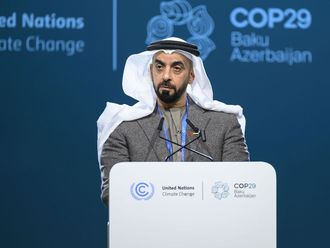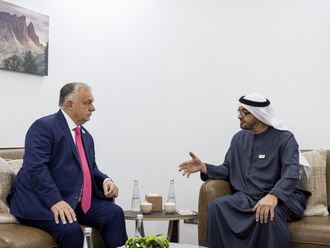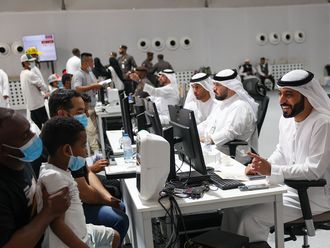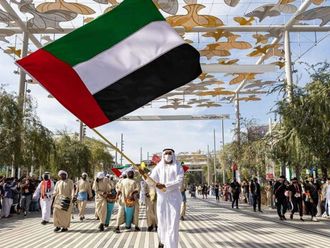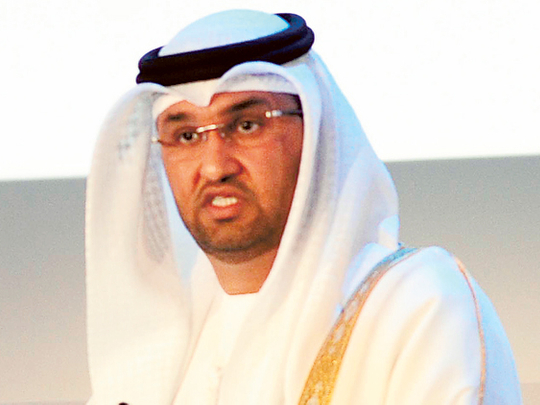
Abu Dhabi: The UAE will place an emphasis on securing food supplies, considering the increasing impact of climate change on its natural resources, said a top official.
“I anticipate there will be an increased emphasis on securing food supplies, through international bilateral and multilateral agreements. This will be combined with research and training efforts to increase food production, while using less energy and water,” said Sultan Ahmad Al Jaber, Minister of State and Special Envoy for Energy and Climate Change, in an interview with Gulf News at Abu Dhabi Ascent, a two-day summit that concluded in the capital on Monday.
“We have seen in recent years climate change and its effects have aggravated the strains on our natural resources. In addition to ensuring future generations enjoy sustainable, renewable energy, we must also safeguard our water and food supplies.”
The UAE was chosen to host the summit, a high-level preparatory meeting for the UN Climate Summit in September this year, for being a pioneer in clean energy and other green initiatives.
Al Jaber talked about the UAE’s green initiatives and the impact the summit has had on international climate talks.
Highlighting climate change impact on the UAE, he said: “We import 90 per cent of our food, and groundwater supplies are being depleted faster than they can be replenished. At the same time, our reliance on desalination for water supplies is unsustainable. It is imperative, going forward, that we aggressively promote water conservation and develop innovative ways to address water security.”
About the different approach to build a consensus on climate change action at Abu Dhabi Ascent, he said, its ground-up approach differed from the UNFCCC’s (United Nations Framework Convention on Climate Change) top-down approach. The summit brought together both the public and private sector to shape and strengthen initiatives across key action areas, including renewable energy and energy efficiency, short-lived climate pollutants and climate resilient agriculture. While the UNFCCC is focused on legally binding agreements, the Abu Dhabi Ascent was where the thinking and work on specific climate change initiatives was done. As such it complemented the on-going work of the UNFCCC, Al Jaber said.
Grass roots organisations
By prioritising action-oriented initiatives, rather than agreements, the Ascent will be integral to enhancing commitments from the public-private sector, to complement the global climate agreement that will hopefully be achieved in 2015.
Non-Governmental Organisations (NGOs) and similar grass roots organisations have a key role to play in helping to combat climate change. Public support for climate change initiatives is crucial and civil groups can play a key role by reaching out to people, and those in government, to convince them of the long-term benefits of climate action and sustainable lifestyles and livelihoods, he said.
The fact that previous climate summits have not led to a binding agreement on combating climate change makes the Abu Dhabi Ascent, and the subsequent Climate Change Summit in New York, critically important.
“Time is running out. We have perhaps 10 to 15 years to deliver concrete solutions to the challenges posed by climate change.”
By spurring action from the ground, the Abu Dhabi Ascent has broadened and deepened public-private partnerships, creating the momentum needed for a successful Climate Summit, Al Jaber said.
The Abu Dhabi Ascent will act as a catalyst for ambitious commitments from both the private and public sector on climate change initiatives. The ideas and initiatives forged at the Ascent will provide the substance of what will be announced at the UN Climate Summit, he said.
Regarding the so-called differences between developed and developing nations on climate change mitigation, Al Jaber said, the UN Climate Summit will be a platform for action and for shaping the initiatives that will have tangible impacts on both developing and developed countries. Climate change is not country, or region specific. Climate change impacts everyone. So, both developed and developing countries have a common interest in working together to mitigate the effects of climate change. Inaction is no longer an option. There is a growing consensus that nations must cooperate and collaborate in the fight against climate change. The Abu Dhabi Ascent has strengthened private-public sectors partnerships which will deliver specific cross-border solutions, Al Jaber said.


